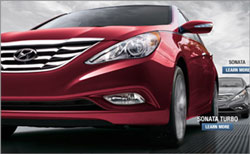automotive
Experian's Q2 Biopsy: Mostly Good News
- by Karl Greenberg , October 13, 2011

When it comes to the auto market, there are focus groups, consumer opinion surveys and consumer perception polls, and then there are new-vehicle registrations -- the vehicles people are actually buying. If there is a gold standard for what's actually happening out in the hoary world of dealerships and garages, it will be new-vehicle registrations.
In credit-tracking firm Experian's second-quarter data on vehicle registrations, the news is good for the domestics, better for Hyundai and Kia, and not so good for Toyota, Honda and Nissan.
Hyundai had the best results, however -- ending the quarter with the most corporate loyalty of any auto brand for the first time. A person who is corporate loyal sticks to a vehicle made by the same company regardless of brand (e.g., buying a Lincoln if you own a Ford.)
advertisement
advertisement
Corporate loyalty actually decreased slightly across the industry, according to Experian, which put GM and Ford in the second and third spots while Toyota and Honda dropped back. Experian said Hyundai kept 49.6% of its buyers, with GM down to 48.1% loyalty.
Ford saw its loyalty increase to 47%, while Toyota and Honda are just above 40%, reflecting substantial drops. And in a big surprise, Chrysler surpassed Nissan in corporate loyalty for the second quarter.
In terms of brand-level loyalty among consumers, Kia leads, with nearly 48% of its owners returning to Kia showrooms. Kia passed sibling Hyundai in brand loyalty in the third quarter last year. Ford comes in second in brand loyalty with Chevrolet, Hyundai and Toyota in a three-way tie for third.
Meanwhile, GM, Chrysler and Nissan all gained market share in the second quarter, while Toyota, Honda and Ford lost share for the second straight quarter. Hyundai's share rose 1.3%; GM rose half a percentage point; Chrysler about a third of a point and Nissan 0.2%. Toyota dropped 2.1% of market share, Honda slid 0.8%, and Ford lost 0.2% share, per Experian.
In terms of new-vehicle registrations, Hyundai had the highest unit gain (over 60,000 vehicles) of any automaker last quarter versus the second quarter last year, and the Fountain Valley, Calif. company also had the highest percentage-point sales gain, at 23.7%
General Motors had the second-highest unit gain, over 53,000 units (over 9.2%), while Chrysler had the second-highest percentage-point gain of 12.2% (over 35,000 units.)
But Toyota had the largest unit and percentage drop, down 81,000 and 17.6% respectively.
How about slicing it by vehicle models? Chevy Cruze leads new-vehicle registrations with over 70,000 in the second quarter, followed by Fiesta, a distant second; Chrysler 200 at third; and Buick Regal, Nissan Juke, Volvo S60, Honda CR-Z, Fiat 500 and Mazda 2. In terms of percentage improvements in new-vehicle registrations by model, Experian says VW Jetta gained the most, followed by Hyundai Elantra. Ford Explorer, Jeep Grand Cherokee and Chevy Equinox. The biggest drop-offs were Honda Civic, Chrysler Town and Country, Toyota Camry and Corolla (down 31,000 units combined) and Honda Accord.
Is there good news for Japanese brands? Yes, actually, from the perspective of net owner migration. After all, General Motors, Ford and Chrysler have been lusting after people who drive cars made by the Japanese brands, but despite Big Three efforts to conquest imports, Toyota and Honda have not lost customers to GM, Ford or Chrysler in the second quarter, per Experian.
The firm says some 26,564 GM customers went to Ford; 29,756 of GM's owners defected to Honda and 27,348 went to Toyota -- and 12,256 Ford customers went to Honda and 6,189 went to Toyota. Toyota lost 16,394 customers, but it lost them to Honda. Chrysler was the most democratic with regard to dispensing its customers: they went to Toyota, Honda, Ford and GM, according to Experian.
On the other hand, the Detroit automakers can find succor in the fact that the migrations to Asian brands are nothing like they were even four years ago. General Motors had 78,745 defections and Chrysler 65,862, while Ford actually gained -- albeit from crosstown rivals. But in 2007 GM lost 330,313 consumers to Honda and Toyota, and Chrysler lost 225,213 customers to everyone. And Ford -- which in 2007 lost a whopping 471,254 customers to Toyota, GM Chrysler and Honda -- actually grew its customer base in the second quarter, meaning a net gain for Ford of around half a million customers versus 2007.
Experian's big picture of the American road puts 243,570,814 light-duty vehicles on the pavement, with Ford the most prevalent make, followed by Chevrolet, Toyota and Honda. Ford F150 is the largest-volume model, followed by the Honda Accord, Toyota Camry and Honda Civic (Honda has two out of the top four.)


